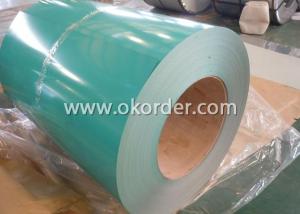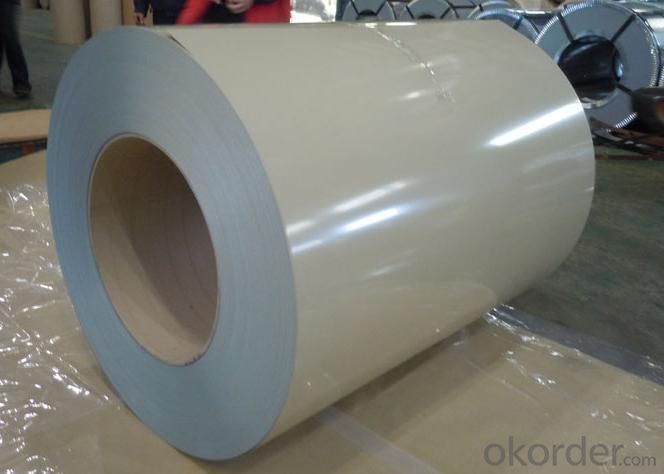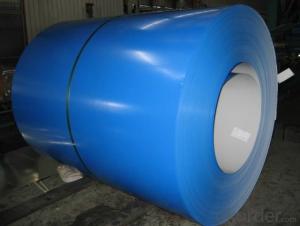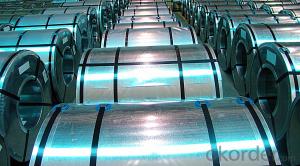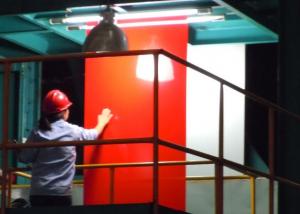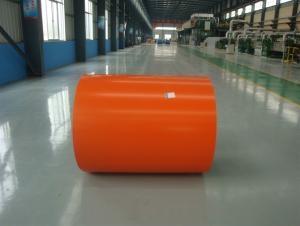Prepainted Aluzinc Steel Coil-RAL 6002
- Loading Port:
- China Main Port
- Payment Terms:
- T/T or L/C
- Min Order Qty:
- 50 mt m.t.
- Supply Capability:
- 100,000 mt/year m.t./month
OKorder Service Pledge
OKorder Financial Service
You Might Also Like
General Information Of Prepainted Aluzinc Steel
With GL as base metal, after pretreatment (degrease and chemical treatment) and liquid dope with several layers of color, then after firing and cooling, finally the plate steel is called pre-painted aluzinc steel. Pre-painted aluzinc steel is good capable of decoration, molding, corrosion resistance. It generally displays superior workability, durability and weather resistance.
Thickness 0.23-1.2mm (BMT) |
Zinc Coating 80-275g/m2 |
Color According to RAL color fan |
Internal Diameter 508mm or 610mm |
Coil Weight 4-8MT |
Quality Commercial and structural quality |
Paint Polyester paint for topside, epoxy for reverse |
Standard JIS G 3312, ASTM A755M, EN 10169 |
Base Steel Grade SGCC,SGCD,DX51D+Z,DX52D+Z;S200GD,S220GD, S280GD,S350GD,CS,FS,SS |
Technical Data Of Prepainted Aluzinc Steel
Yield Strength | (Mpa) 280-320 |
Tensile Strength | (Mpa) 340-390 |
Elongation | 20%-30% |
Reverse Impact | 9J |
T-bending | ≥2T |
Pencil Hardness | ≥2H |
Duration Of Salt Spray Test | 500 H |
Bending At 180 Degree | No crack, purling and fraction |
Application Of Prepainted Aluzinc Steel
Outdoor:
roof, roof structure, surface sheet of balcony,
frame of window, door, door of garage, roller shutter door, booth, Persian blinds, cabana, etc.
In door:
door, isolater, frame of door, light steel structure of house, home electronic appliances, etc.
Packaging & Delivery Of Prepainted Aluzinc Steel
Anti-damp paper inside full wrapped with plastic film, iron sheet outside on wooden pallet in 20 feet container with 25mt
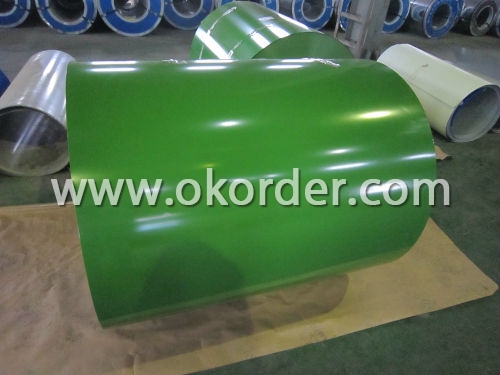
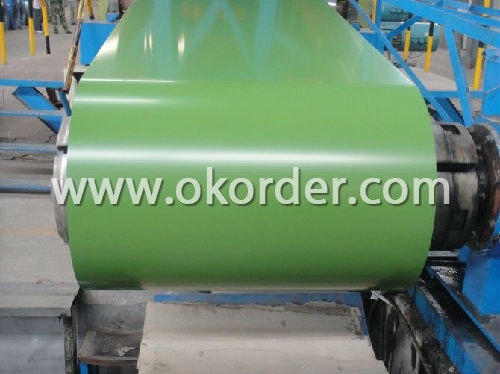
- Q: How are steel coils used in the manufacturing of agricultural structures?
- Steel coils are used in the manufacturing of agricultural structures as they provide the necessary strength and durability required for building structures such as barns, grain storage facilities, and equipment sheds. These coils are often used to fabricate beams, columns, and trusses, ensuring structural stability and resistance to harsh weather conditions. Additionally, steel coils are also used in the production of agricultural machinery and equipment, further enhancing the efficiency and reliability of farming operations.
- Q: How are steel coils used in the construction of bridges?
- Steel coils are an essential component in the construction of bridges. These coils are typically made from high-strength steel and are used for various purposes throughout the bridge-building process. One of the primary uses of steel coils in bridge construction is for manufacturing structural components. These coils are cut, shaped, and welded together to create beams, columns, and trusses. These structural elements provide strength and support to the bridge, ensuring its stability and durability. Steel coils are also used in the fabrication of bridge decks. These decks are the upper surface of the bridge, providing a roadway for vehicles and pedestrians. The coils are rolled into sheets and then further processed to create the deck plates. These plates are then assembled and attached to the bridge's structural components. Another important application of steel coils in bridge construction is for reinforcing concrete structures. Rebar, which is short for reinforcing bar, is made from steel coils and is embedded within the concrete to enhance its strength and resistance to tension. The rebar is typically placed in strategic locations, such as within the bridge piers and abutments, to provide additional support and prevent cracking or collapsing. Additionally, steel coils are used for manufacturing bridge expansion joints. Expansion joints are critical components that allow bridges to expand and contract with temperature changes and other external factors. These joints are made using steel coils, which are formed into plates or strips that can be easily installed and adjusted to accommodate the bridge's movement. In summary, steel coils play a crucial role in the construction of bridges. They are used for manufacturing structural components, bridge decks, reinforcing concrete structures, and expansion joints. Steel coils provide the necessary strength and support required for building safe and reliable bridges that can withstand various loads and environmental conditions.
- Q: What are the common applications of steel coils in construction?
- Steel coils are commonly used in construction for various applications such as structural components, including beams, columns, and trusses. They are also used for roofing and cladding systems, as well as in the fabrication of reinforcing bars and precast concrete elements. Additionally, steel coils are utilized in the manufacturing of pipes, tubes, and sheet metal products, serving as a crucial material in the construction industry.
- Q: How are steel coils used in the production of medical equipment?
- Steel coils are used in the production of medical equipment in a variety of ways. One common use is in the manufacturing of surgical instruments. Many surgical instruments, such as scalpels, forceps, and clamps, require a sharp and durable cutting edge. Steel coils are used to create these cutting edges, as they can be easily shaped, hardened, and sharpened to ensure precision and longevity. Additionally, steel coils are often used in the production of medical devices such as braces, orthopedic implants, and prosthetics. These devices require materials with high strength and durability to support and stabilize the body. Steel coils can be formed into different shapes and sizes to meet the specific needs of patients, providing the necessary support and functionality. Furthermore, steel coils are used in the production of medical equipment such as MRI machines and X-ray systems. These machines require strong and reliable components to ensure accurate imaging and diagnostics. Steel coils are used in the construction of these machines to provide stability and structural support, allowing for precise and high-quality imaging. In summary, steel coils play a crucial role in the production of medical equipment by providing strength, durability, and versatility. From surgical instruments to orthopedic devices and diagnostic machines, steel coils are utilized to create reliable and high-performing medical equipment that ultimately improves patient care and outcomes.
- Q: I'm going to buy a guitar for beginners and i wondered what strings are better steel or nylon?
- I urge you to read the answer from OU again and ignore the others - who obviously haven't got the first clue of what they're talking about. You pick the guitar for the type of music (and sound) you're after. You can play basically everything on a steel string that you can on a nylon string, plus a whole lot more... And no, a classical guitar is NOT easier to play than a well adjusted steel string with light strings - in fact it's the opposite. A classical guitar has a wide, flat fingerboard, something which makes chords much harder to play. Furhermore, the scale is longer (the scale is the distance between the nut and bridge - the length of the vibrating string if you will). This longer scale increase the distance between the fret (increasing the reach), and also increase the string tension. Finally, the action (string height) is larger on a classical/nylon string guitar as opposed to a steel string guitar which has been properly adjusted. Most guitars off the shelf have an inferior set up for a beginner, and this is why many have this funny idea that a steel string is much harder to play. You may also want to check out guitar body sizes (steel string) that is smaller than the large Jumbo or Dreadnought varieties. In essence, if you play classical music, or classical finger style guitar - choose a nylon string instrument. If not, then get a steel string and have it properly adjusted. Make sure you try out a lot of models as the necks, bodies, woods etc, differ a lot.
- Q: How do steel coil manufacturers handle custom orders?
- Custom orders for steel coils are handled by manufacturers through a methodical process. They begin by comprehending the specific requirements of the customer and engaging in detailed communication to gather information. This includes dimensions, tolerances, and other special needs. Manufacturers may offer technical expertise to ensure the feasibility of the custom order. Once the requirements are clarified, manufacturers proceed with designing and engineering the custom steel coils. Advanced software and engineering tools are utilized to create detailed designs and specifications that cater to the customer's unique needs. Prototypes or samples may be created for the customer's approval before full-scale production. After the design phase, manufacturers initiate the production process by sourcing the appropriate raw materials, such as steel coils with the desired composition and thickness. The coils undergo various manufacturing stages, including cutting, shaping, and forming, to achieve the desired dimensions and shapes. Specialized equipment and machinery guarantee precision and accuracy throughout the production process. Quality control plays a crucial role in handling custom orders. Manufacturers conduct thorough inspections and testing procedures at different stages of production to ensure that the custom coils meet the customer's specifications and industry standards. This involves checking for dimensional accuracy, surface finish, mechanical properties, and other specific requirements. Third-party inspection agencies may be involved, and manufacturers may provide customers with test reports and certifications to ensure quality assurance. Lastly, once the custom steel coils are manufactured and pass all quality checks, they are meticulously packaged and delivered to the customer. Manufacturers ensure proper packaging and shipping methods to prevent damage during transit and ensure the coils reach the customer in optimal condition. In summary, steel coil manufacturers handle custom orders by collaborating closely with customers, designing and engineering specialized coils, maintaining quality control throughout the production process, and delivering the custom coils to the customer's satisfaction. This systematic approach enables manufacturers to meet the unique requirements of each customer and provide high-quality custom steel coils.
- Q: i need the same kind of body jewelry they use in the piercing shop but when i go to order them they say stainless steel, not surgical steel, and i have REALLY sensitive skin so i need to be sure, whats the difference?
- There are hundreds of different grades of stainless steel. Jewelery used for piercings should be made of implant grade. Note that the term surgical steel is not a technical term. It doesn't mean anything, although it sometimes refers to what is technically implant grade stainless. Implant grade stainless steel must conform to the ASTM standard 316LVM F-138-00, otherwise the seller cannot call it implant grade. This is something you should always ask about specifically. Are your stainless items F-138-00 compliant? Jewelry that only claims to be stainless isn't good enough. Jewelery sold in mall stands are typically nickel plated, bargain-basement low grade stainless. Allergies to nickel are common.......BUT there is a big difference between allergies, and infections. Infections are caused by bacteria, not by the metal itself, and if you're getting infections it's a sign you're not keeping the piercing clean and sanitary. Simply switching to a different metal won't prevent infections from recurring. To prevent infections you need to take steps to keep new piercing clean and sanitary. the best way to do this is rinse with 50:50 hydrogen peroxide and water daily, then apply some neosporin. hope this helps.
- Q: Is there alloys in low carbon steel or non
- Stainless Steels are alloys that are made up of iron and generally contain around 11.5% chromium. For obtaining special properties, nickel, carbon, chromium, and other elements can be added to it. There are four types of Steel : Carbon Steel Alloy Steel Stainless Steel Tool Steel From kitchen utensils to cutlery, sinks to machine drums, as well as microwave oven liners mainly, use Stainless Steel. One can find different types of products such as Stainless Steel Tube Fittings, Pipe Fittings, Flanges, pipes, Tubes, Fasteners, Sheets, Rods, Bars and so forth are used in different industries. List of typical applications of these Stainless Steel products include: Oil and gas equipments Offshore technology Seawater desalination plants Chemical industry Bridges Storage tanks Medical Industry Civil Engineering Pressure vessels, reactor tanks, and heat exchangers Rotors, impellers and shafts Power plants Petrochemical Shipbuilding industry
- Q: How do steel coils contribute to energy performance in buildings?
- Steel coils can contribute to energy performance in buildings by providing insulation and thermal efficiency. The coils are often used in HVAC systems to enhance the heating and cooling processes, thus reducing energy consumption and improving overall energy efficiency. Additionally, steel coils can be used in roofing and cladding systems, providing insulation and helping to maintain a comfortable indoor temperature. By effectively managing heat transfer and reducing energy loss, steel coils play a crucial role in enhancing energy performance in buildings.
- Q: What is the thickness range of steel coils?
- The thickness range of steel coils varies depending on the specific application and industry. However, generally speaking, steel coils can have a thickness range from as thin as 0.005 inches (0.13 mm) to as thick as 0.5 inches (12.7 mm) or more.
1. Manufacturer Overview
| Location | Jiangsu, China |
| Year Established | 2003 |
| Annual Output Value | US$1 Million - US$2.5 Million |
| Main Markets | Southern Asia; America; South America; Eastern Europe |
| Company Certifications | ISO 9000 ISO 14000 OHSAS 18000 |
2. Manufacturer Certificates
| a) Certification Name | |
| Range | |
| Reference | |
| Validity Period |
3. Manufacturer Capability
| a) Trade Capacity | |
| Nearest Port | Shanghai |
| Export Percentage | 1% - 10% |
| No.of Employees in Trade Department | 100 People |
| Language Spoken: | English; Chinese |
| b) Factory Information | |
| Factory Size: | Above 200,000 square meters |
| No. of Production Lines | 14 |
| Contract Manufacturing | Design Service Offered |
| Product Price Range | Average |
Send your message to us
Prepainted Aluzinc Steel Coil-RAL 6002
- Loading Port:
- China Main Port
- Payment Terms:
- T/T or L/C
- Min Order Qty:
- 50 mt m.t.
- Supply Capability:
- 100,000 mt/year m.t./month
OKorder Service Pledge
OKorder Financial Service
Similar products
Hot products
Hot Searches
Related keywords
